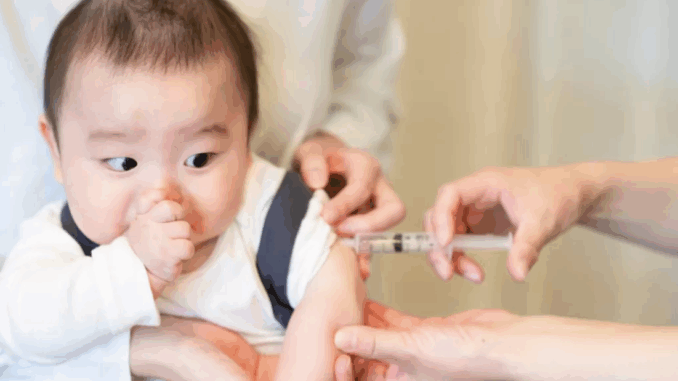Sudden Infant Death Syndrome (SIDS) remains a heartbreaking mystery for parents and medical professionals alike. In recent years, questions have surfaced about a potential link between routine infant vaccinations and SIDS, fueled by both parental experiences and emerging research. Six major studies have now revealed a striking statistic: up to 78% of SIDS cases occur within the first week following childhood immunizations, prompting calls for more transparent and independent investigations into vaccine safety. Children’s Health Defense has been at the forefront of highlighting these concerns.
Dr. Paul Thomas Sounds the Alarm
Dr. Paul Thomas, a Dartmouth-trained pediatrician and father of nine, has become a vocal advocate for re-examining vaccine safety protocols. During a recent Children’s Health Defense podcast, he stated, “These vaccines are killing infants. You take your healthy baby into the office, and then you find them dead? The most deaths happen on the first day [post-vaccination]. Day zero. Then the next most common death day is day two. And then day three.” His book, Vax Facts, dedicates a chapter to SIDS, summarizing findings from six well-conducted studies that link 78% of SIDS cases to the week following vaccination, with the TDAP vaccine being particularly concerning.
[](https://x.com/ChildrensHD/status/1917625647448416275)What the Studies Reveal
The six studies Dr. Thomas references analyzed data from the Vaccine Adverse Event Reporting System (VAERS) and other sources, finding that of 2,605 infant deaths reported between 1990 and 2019, 58% occurred within three days post-vaccination, and 78.3% within seven days. These findings suggest a temporal clustering that cannot be easily dismissed. For example, a 2021 study published in Toxicology Reports noted, “The excess of deaths during these early post-vaccination periods was statistically significant (p < 0.00001).” While correlation does not imply causation, the consistency across multiple datasets raises red flags.
[](https://www.sciencedirect.com/science/article/pii/S2214750021001268)HUGE: 78% of SIDS cases occurred within the first week following the vaccine
— Children’s Health Defense (@ChildrensHD) April 30, 2025
This is not a coincidence.
When looking at six separate studies on the instance of SIDS post vaccination, 78% of SIDS cases occurred within the first week following the vaccine.
There is an undeniable… pic.twitter.com/5PIrgvMYy0
Particularly worrisome is the TDAP vaccine, often administered to infants as part of the CDC’s recommended schedule. Dr. Thomas highlights that the majority of SIDS cases in these studies followed multi-vaccine visits, where infants received several shots simultaneously, potentially overwhelming their developing immune systems.
[](https://childrenshealthdefense.org/defender/pediatricians-paid-vaccinate-children-pharma-payment-scheme-dr-paul-thomas/)CDC and WHO: A Contrasting View
Despite these findings, the Centers for Disease Control and Prevention (CDC) and the World Health Organization (WHO) maintain that vaccines do not cause SIDS. The CDC cites studies, such as a 2003 Institute of Medicine report, which found no causal link between vaccines like DTP or hepatitis B and SIDS. They argue that immunizations may even reduce SIDS risk by preventing infectious diseases that could trigger fatal events in vulnerable infants. The “Back to Sleep” campaign, launched in 1994, is credited with a dramatic decline in SIDS rates, further complicating the narrative around vaccines.
[](https://www.cdc.gov/vaccine-safety/about/sids.html)[](https://www.vaccinesafety.edu/do-vaccines-cause-sudden-infant-death-syndrome-sids/)However, critics argue that the CDC’s reliance on older studies and passive surveillance systems like VAERS, which may underreport adverse events, limits the ability to detect rare but serious outcomes. The lack of large-scale, independent studies comparing vaccinated and unvaccinated populations fuels skepticism.
[](https://pmc.ncbi.nlm.nih.gov/articles/PMC8255173/)Parental Concerns and the Need for Transparency
For parents who have lost a child to SIDS shortly after vaccination, the official stance feels dismissive. Case reports, such as a 2017 U.S. Vaccine Injury Compensation Program decision, document infants dying within days of receiving multiple vaccines, with autopsies revealing no other cause. These stories underscore the emotional weight of the issue and the urgent need for answers.
[](https://www.ncbi.nlm.nih.gov/pmc/articles/PMC9897596/)Health professionals and advocates emphasize that open dialogue and rigorous research are essential for maintaining public trust. “Transparency is critical when it comes to infant health,” says Dr. Thomas, urging for studies free from pharmaceutical industry influence. The call for independent research is echoed by organizations like Children’s Health Defense, which advocates for informed consent and vaccine safety reforms.
[](https://childrenshealthdefense.org/defender/pediatricians-paid-vaccinate-children-pharma-payment-scheme-dr-paul-thomas/)Moving Forward: What’s Needed
The debate over SIDS and vaccinations highlights a broader tension between public health policy and individual choice. While vaccines have undoubtedly reduced the burden of infectious diseases, the clustering of SIDS cases post-vaccination demands further scrutiny. Proposed steps include:
- Funding independent, placebo-controlled studies to compare health outcomes in vaccinated and unvaccinated infants.
- Improving VAERS to ensure comprehensive reporting of adverse events.
- Encouraging pediatricians to discuss vaccine risks and benefits openly with parents, respecting informed consent.
As the conversation evolves, one thing is certain: parents deserve clear, unbiased data to make informed decisions about their children’s health. Until then, the questions surrounding SIDS and vaccines will persist, driving both concern and hope for a safer future.
Author: Planet-Today.com
Source: Children’s Health Defense
